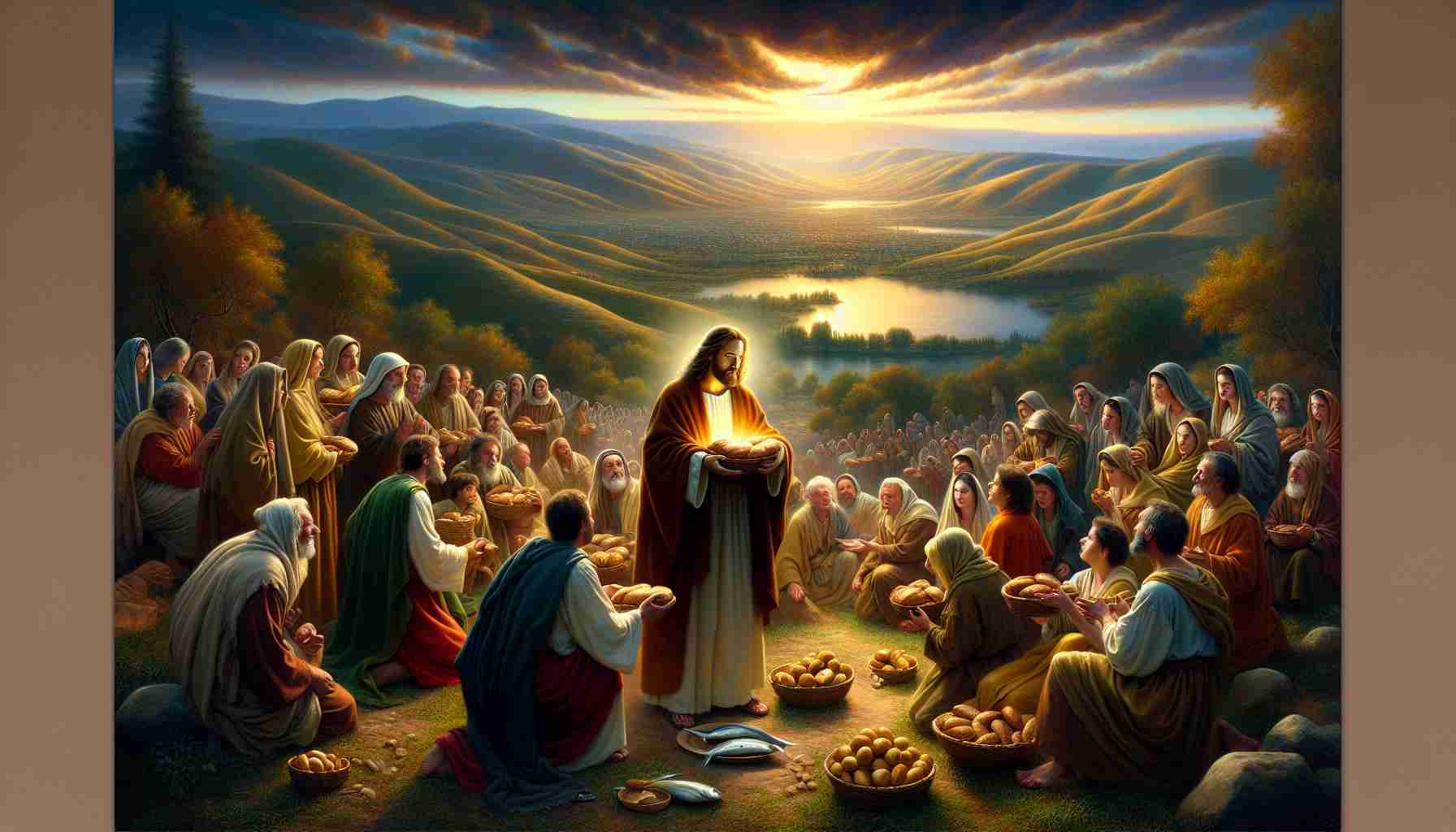

The sun baked the hillside above the Sea of Galilee, and the dry wind carried the scent of fish and sweat. Ruben shifted his weight on the rock where he sat, legs drawn to his chest, watching as throngs of people streamed up from the lake. Word had passed like wildfire—Yeshua was near again. The healer. The teacher. The man who spoke with more authority than the priests in Jerusalem. Even Roman patrols gave a wide berth to the crowds that followed Him.
Ruben had not meant to come. He’d only ventured out to trade fish in the village below. But noise and movement magnetized him, the tide of humanity sweeping him along until he found himself here—empty-handed, dizzy with heat, stomach twisted with hunger.
He hadn’t eaten since yesterday. Not since he gave what little salted fish he had to his mother before she worsened. Her cough kept her from market work now. Ruben hated leaving her alone. Yet the boy barely counted as a man, and in their village, orphans were common. No one owed him anything.
He rubbed at his stomach, warily eyeing a family on a nearby rock tearing at the edges of dry bread. Most here came prepared—except for the desperate few like him. The forgotten. Cold shame coiled in his chest. He’d come looking for something, anything, but here even hope seemed reserved for others.
Movement stirred ahead. Someone was speaking—loud, with purpose. Heads turned. It was one of Yeshua’s followers. Striding through the crowd, asking questions.
“Does anyone have food?” he called.
Ruben’s heart stuttered. He watched a young boy—a small one, perhaps seven or eight—crawl forward. The child opened a cloth bundle and showed five loaves and two dried fish. Ancient bread. Barely enough for a single family.
The boy offered it.
Stupid, Ruben thought. Why give it up? There’s not enough.
But the man took the bundle gently, almost reverently, and disappeared into the mass. Minutes later, the crowd stirred again. Yeshua stood at the center—a man of plain appearance, but when He raised His eyes, the air itself seemed to hush.
He gave thanks aloud, raising the little food.
Then they began to hand it out.
Loaves broke again and again. Fish multiplied in baskets. Ruben stared as food passed from the front down each row. There was no frenzy—just peace. Laughter. Awe.
A stranger beside him handed him bread and fish. Still warm. Ruben brought it to his lips, trembling. By the time he finished eating, his belly ached from fullness.
But it was more than food.
He looked at the boy again—fearless in his giving.
The shame in Ruben’s chest cracked open, replaced by something foolish and tender.
Not forgotten. Not missed. Not invisible.
Yeshua had seen them.
Ruben stood slowly, shielding his eyes to watch the man who had fed thousands from a child’s lunch. Tears pricked his eyes.
Next time, he thought, I’ll bring whatever I have.
Even if it’s barely enough.
Maybe especially then.
The sun baked the hillside above the Sea of Galilee, and the dry wind carried the scent of fish and sweat. Ruben shifted his weight on the rock where he sat, legs drawn to his chest, watching as throngs of people streamed up from the lake. Word had passed like wildfire—Yeshua was near again. The healer. The teacher. The man who spoke with more authority than the priests in Jerusalem. Even Roman patrols gave a wide berth to the crowds that followed Him.
Ruben had not meant to come. He’d only ventured out to trade fish in the village below. But noise and movement magnetized him, the tide of humanity sweeping him along until he found himself here—empty-handed, dizzy with heat, stomach twisted with hunger.
He hadn’t eaten since yesterday. Not since he gave what little salted fish he had to his mother before she worsened. Her cough kept her from market work now. Ruben hated leaving her alone. Yet the boy barely counted as a man, and in their village, orphans were common. No one owed him anything.
He rubbed at his stomach, warily eyeing a family on a nearby rock tearing at the edges of dry bread. Most here came prepared—except for the desperate few like him. The forgotten. Cold shame coiled in his chest. He’d come looking for something, anything, but here even hope seemed reserved for others.
Movement stirred ahead. Someone was speaking—loud, with purpose. Heads turned. It was one of Yeshua’s followers. Striding through the crowd, asking questions.
“Does anyone have food?” he called.
Ruben’s heart stuttered. He watched a young boy—a small one, perhaps seven or eight—crawl forward. The child opened a cloth bundle and showed five loaves and two dried fish. Ancient bread. Barely enough for a single family.
The boy offered it.
Stupid, Ruben thought. Why give it up? There’s not enough.
But the man took the bundle gently, almost reverently, and disappeared into the mass. Minutes later, the crowd stirred again. Yeshua stood at the center—a man of plain appearance, but when He raised His eyes, the air itself seemed to hush.
He gave thanks aloud, raising the little food.
Then they began to hand it out.
Loaves broke again and again. Fish multiplied in baskets. Ruben stared as food passed from the front down each row. There was no frenzy—just peace. Laughter. Awe.
A stranger beside him handed him bread and fish. Still warm. Ruben brought it to his lips, trembling. By the time he finished eating, his belly ached from fullness.
But it was more than food.
He looked at the boy again—fearless in his giving.
The shame in Ruben’s chest cracked open, replaced by something foolish and tender.
Not forgotten. Not missed. Not invisible.
Yeshua had seen them.
Ruben stood slowly, shielding his eyes to watch the man who had fed thousands from a child’s lunch. Tears pricked his eyes.
Next time, he thought, I’ll bring whatever I have.
Even if it’s barely enough.
Maybe especially then.